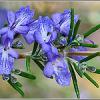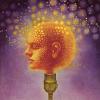Weird story - I was worried I might have brain cancer because I was suffering from unusual headaches and was worried this might be connected some kind of bcl-2 interruptions caused by the use of rasagiline to boost GDNF 2 months ago (1.5mg / day).
Anyways I remembered reading that Longvida phospholipid curcumin was being used for Alzheimers trials and found 4g Longvida (8 caps) should give you .22uM/L free curcumin; which should be on the edge of clinical efficacy for alzheimers.[1] The fluorescent curcumin has actually even been observed binding to the amyloid plaques be using retinal scans. [2]
I decided to take it as a cancer preventative, the idea was to ensure that bcl-2 induction wasn't somehow stuck 'on' from the rasagiline. I was pleasantly surprised after the third day, when I found that my ability to concentrate was much better than usual. I could read lengthy articles more quickly than usual, while still understanding the concepts. I haven't done any cognitive tests, but the headaches are now gone.
[1] http://truttmd.com/c...-created-equal/ referencing: Gota et al. Safety and Pharmacokinetics of a Solid Lipid Curcumin Particle Formulation in Osteosarcoma Patients and Healthy Volunteers J. Agric. Food Chem., 2010, 58 (4), pp 2095–2099 http://pubs.acs.org/doi/abs/10.1021/jf9024807
[2] Chin et al., Neuroprotective Properties of Curcumin in Alzheimer's Disease - Merits and Limitations, Current Medicinal Chemistry, Volume 20, Number 32, October 2013, pp. 3955-3985(31).
Edited by Phoenicis, 22 July 2014 - 02:57 PM.

















































